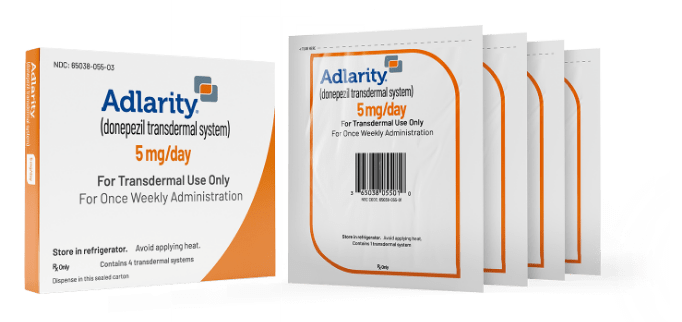For US Healthcare Professionals only.

Available in 5-mg and 10-mg strengths.1
ADLARITY may be applied to the upper back below the shoulder blades (avoiding the spine), where it may be less likely to be removed by the patient, or the lower back.2

Back and
upper buttocks
ADLARITY may be easily self-applied on the upper buttocks or the upper outer thigh.2

Upper buttocks or the
upper outer thigh
ADLARITY should be replaced every 7 days. Only 1 transdermal system should be worn at a time.1
Work with the patient or caregiver to discuss and select a minimum of 3 application sites. The same application site must not be used for 14 days after removing a transdermal system from that site.1
See the Instructions for Use for step-by-step instructions.
NOTE: Samples of ADLARITY are packaged differently than what is dispensed in the pharmacy. Samples of ADLARITY 5 mg/d and ADLARITY 10 mg/d contain 1 transdermal system per carton (1 week of treatment).

1 carton = 4 transdermal systems = 28 days of treatment
Storage and temperature considerations1,3
Store ADLARITY in the refrigerator.1
Prior to application, allow the pouch to reach room temperature before opening. Use the ADLARITY transdermal system within 24 hours of removing from the refrigerator.1
Missed dose1
ADLARITY is indicated for the treatment of mild, moderate, and severe dementia of the Alzheimer's type.
ADLARITY is contraindicated in patients with known hypersensitivity to donepezil or to piperidine derivatives or with a history of allergic dermatitis with use of ADLARITY.
ADLARITY is indicated for the treatment of mild, moderate, and severe dementia of the Alzheimer's type.
ADLARITY is contraindicated in patients with known hypersensitivity to donepezil or to piperidine derivatives or with a history of allergic dermatitis with use of ADLARITY.
The most common adverse reactions (greater than 5% with donepezil tablets and twice the placebo rate) are nausea, diarrhea, insomnia, vomiting, muscle cramps, fatigue, and anorexia.
Cholinesterase inhibitors, including donepezil, have the potential to interfere with the activity of anticholinergic medications. A synergistic effect may be expected when cholinesterase inhibitors are given concurrently with succinylcholine, similar neuromuscular blocking agents, or cholinergic agonists such as bethanechol.
You are encouraged to report negative side effects of prescription drugs to the FDA. Visit www.fda.gov/MedWatch or call 1‑800‑FDA‑1088. Please click here for Full Prescribing Information.
References: 1. ADLARITY. Prescribing information. Corium, LLC; 2022. 2. ADLARITY. Instructions for use. Corium, LLC; 2022. 3. Data on file. Corium, LLC.
Adlarity® (donepezil transdermal system) 5mg and 10mg patches have been voluntarily withdrawn due to a matter related to the product’s contract manufacturer. This decision is not related to any safety or efficacy issues with the product. Healthcare professionals can contact 1-800-910-8432. Patients should talk to their healthcare professionals.